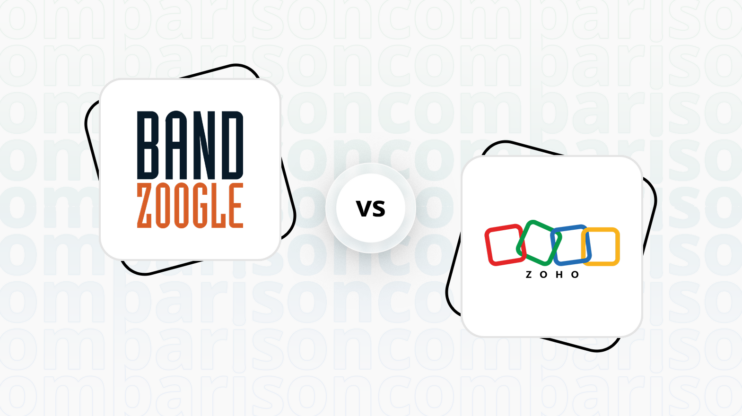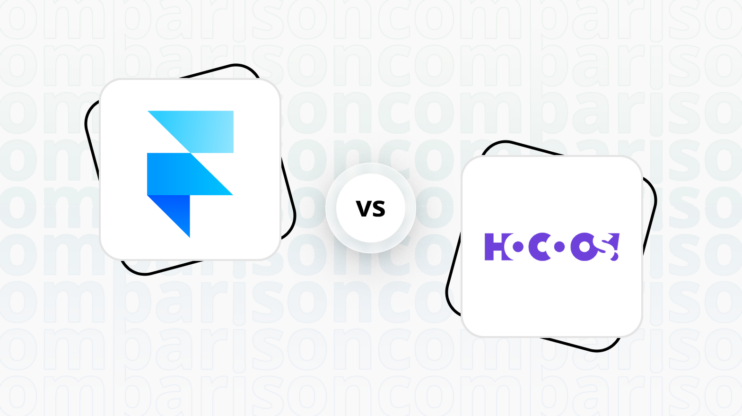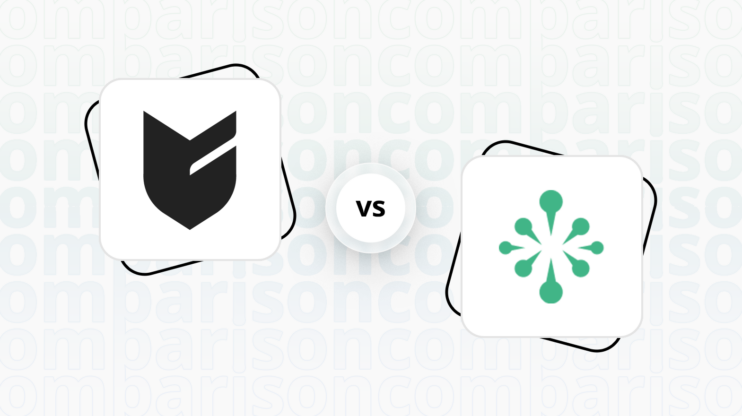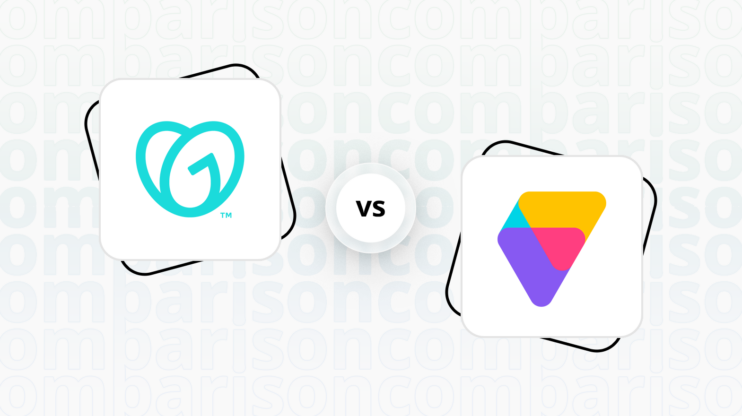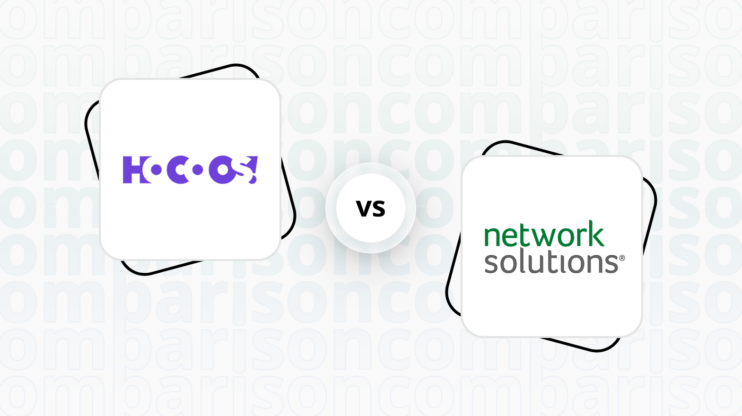Final verdict
Adobe Commerce(ex Magento) and Yola both offer unique strengths, catering to different user needs and business sizes.
-
Adobe Commerce(ex Magento) (Overall Grade: 6.9/10)
is a powerful, enterprise-level ecommerce platform ideal for both B2B and B2C businesses. It excels in providing extensive customization options, advanced marketing tools, and robust security features. Adobe Commerce is best suited for businesses looking for a scalable and flexible solution that can handle complex ecommerce needs. However, it comes with a steeper learning curve and higher costs, making it more suitable for larger businesses with technical expertise. -
Yola (Overall Grade: 6.5/10)
is a user-friendly website builder designed for individuals and small businesses. It offers a drag-and-drop interface, a variety of customizable templates, and essential ecommerce capabilities. Yola is perfect for users who prioritize ease of use and affordability. While it may not match the advanced features and scalability of Adobe Commerce, Yola provides a comprehensive solution for creating and managing a professional online presence without the need for advanced technical skills.

|

|
|
|---|---|---|
|
Design functionalities & templates |
6.7 |
7.2 |
|
Ease of use |
5.4 |
8.0 |
|
Ecommerce |
9.4 |
5.7 |
|
Website Editors |
7.8 |
6.7 |
|
Product testing options |
3.9 |
7.5 |
|
Price |
5.8 |
8.1 |
|
Hosting quality |
8.1 |
7.2 |
|
Website speed optimization |
6.6 |
7.5 |
|
Plugins/extensions and integrations |
9.1 |
6.3 |
|
Marketing features |
8.1 |
6.5 |
|
Customer support |
8.3 |
6.3 |
|
Website security |
8.4 |
8.3 |
|
AI capabilities |
7.7 |
0.0 |
|
User Management |
8.0 |
7.3 |
Best for ecommerce
 9.4
9.4
 5.7
5.7
Verdict
: Adobe Commerce(ex Magento) is the superior choice for robust, scalable ecommerce solutions, while Yola is more suited for small businesses and individuals looking for simplicity.
-
Adobe Commerce(ex Magento)
: With a score of 9.4, Adobe Commerce is a powerhouse for ecommerce, offering extensive customization, advanced marketing tools, and seamless integration with various payment gateways. It is ideal for both B2B and B2C businesses that require a scalable and versatile platform. Its comprehensive features make it the go-to choice for serious ecommerce operations. -
Yola
: Scoring 5.7, Yola is designed for ease of use, making it perfect for small businesses and individuals. It offers essential ecommerce features and a user-friendly interface but lacks the advanced capabilities and scalability of Adobe Commerce. Yola is best for those who need a straightforward, no-fuss solution for their online store.
Best for informational & business websites
 7.4
7.4
 7.4
7.4
Verdict
: Both Adobe Commerce(ex Magento) and Yola score equally for informational business websites, but they cater to different user needs. Adobe Commerce(ex Magento) is more suited for businesses needing extensive customization and scalability, while Yola is ideal for users seeking simplicity and ease of use.
-
Adobe Commerce(ex Magento)
: Known for its flexibility and scalability, Adobe Commerce(ex Magento) is a robust platform that supports both B2B and B2C models. It offers extensive customization options, AI-driven personalization, and integration with Adobe Experience Cloud. However, its complexity and steeper learning curve make it less ideal for users without technical expertise. -
Yola
: Yola excels in providing a user-friendly experience with its drag-and-drop interface and a variety of responsive templates. It is designed for individuals and small businesses looking to create professional websites without advanced technical skills. Yola’s simplicity and ease of use make it a strong contender for those prioritizing straightforward website management.
Detailed comparison
Design functionalities & templates
Design FunctionalitiesRepresents how well each platform allows for creative design and customization of websites.Score Components:
- Template Variety (30%): Range and quality of design templates.
- Customization (30%): Flexibility and options for design alterations.
- User Interface (20%): Ease and intuitiveness of the design process.
- Responsiveness (10%): Adaptability to different devices and screen sizes.
- Innovation (10%): Unique design features and tools.
 6.7
6.7
 7.2
7.2
🏆
Winner: Yola.
Yola offers a more diverse range of templates and designs, catering to various types of websites. It also provides a user-friendly design tool, making it easy for users to create a unique and visually appealing website without needing advanced technical skills.
Adobe Commerce, formerly Magento, prioritizes flexibility over pre-built templates. While it offers a limited selection of base themes, users can access third-party themes for customization. Theme options are highly adaptable, allowing changes to layouts, colors, fonts, and the creation of custom page layouts.
Adobe Commerce(ex Magento) Themes
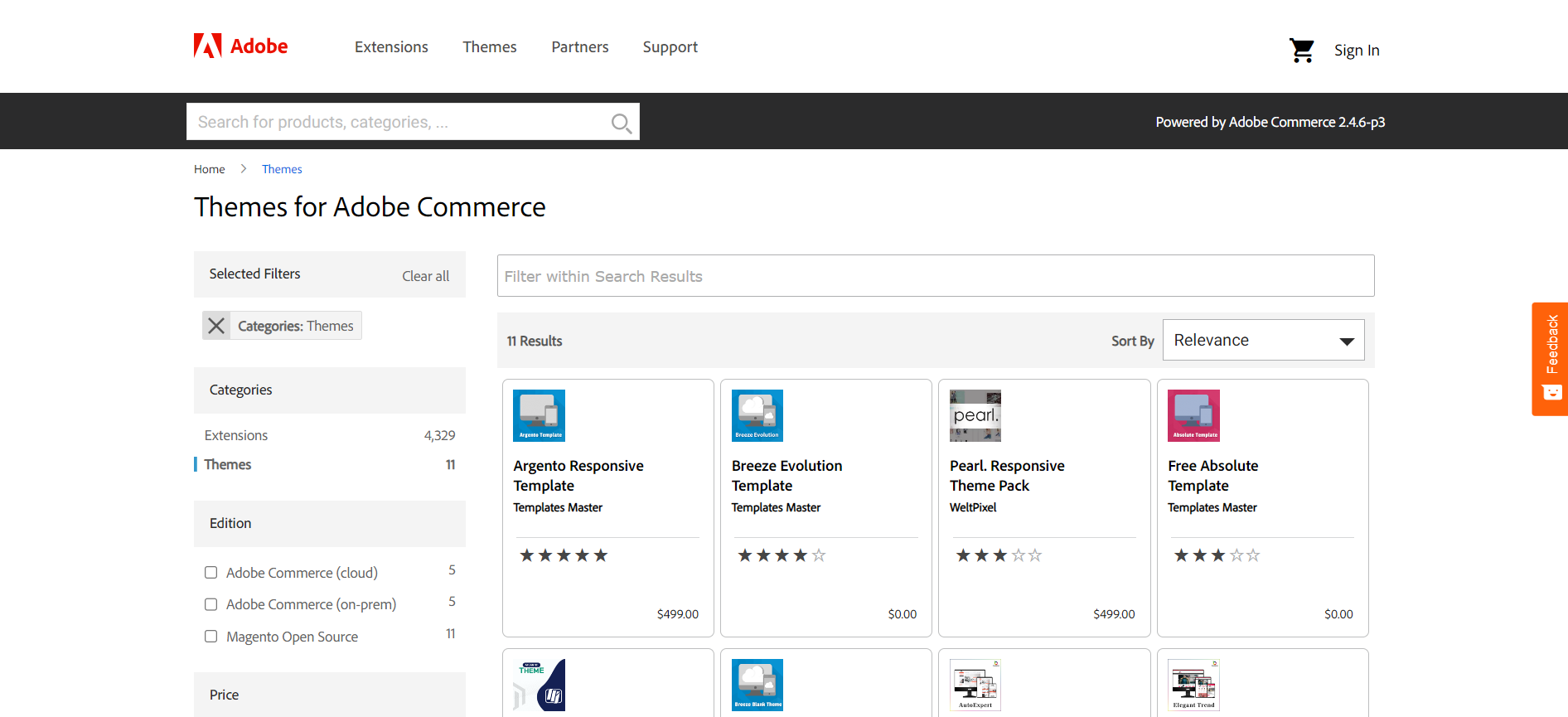
Compared to Adobe Commerce, Yola offers a diverse range of templates and designs, catering to various types of websites, from personal blogs to professional business sites. Users can choose from a wide selection of themes, each customizable to fit their specific needs and preferences.


Get a head start on website creation with AI
Create a custom website tailored to your business needs 10X faster with 10Web AI Website Builder!
Ease of use
Ease of useReflects the platform’s overall user-friendliness.Score
Components:
- Learning curve (40%): Quickness and ease of getting started.
- Interface design (30%): Simplicity and intuitiveness of layout.
- User guidance (20%): Quality of tutorials and support.
- Flexibility (10%): Adaptability to various user skills.
 5.4
5.4
 8.0
8.0
🏆 Winner: Yola
. Scoring an impressive 8.0, Yola is designed with simplicity in mind, making it accessible for users of all skill levels to create and manage their websites. Adobe Commerce(ex Magento), with a score of 5.4, offers a robust platform but with a steeper learning curve, especially for those without technical expertise. If ease of use is a priority, Yola is the clear winner in this category.
Learning Resources
🏆 Winner: Adobe Commerce(ex Magento)
. While both platforms offer solid learning resources, Adobe Commerce(ex Magento) goes a step further with its wide array of detailed tutorials and active community forums, making it easier for users to learn and adapt.
For ecommerce
EcommerceMeasures the platform’s effectiveness in supporting online business activities.Score Components:
- Ecommerce themes and templates (20%): Variety and design of templates.
- Product management (25%): Ease of managing and organizing products.
- Payment options (25%): Variety and convenience of payment methods.
- Ecommerce features (20%): Features for managing an ecommerce store.
- Integration (10%): Compatibility with external e-commerce tools and services.
 9.4
9.4
 5.7
5.7
Adobe Commerce (formerly Magento) and Yola both offer ecommerce capabilities, but they cater to different types of businesses. Adobe Commerce is an enterprise-level ecommerce platform suitable for both B2B and B2C businesses, offering a comprehensive set of tools for establishing and managing successful online stores of varying sizes. On the other hand, Yola is more suited for individuals and small businesses, providing an easy-to-use, drag-and-drop website builder with ecommerce capabilities.

|

|
|
|---|---|---|
|
Ecommerce themes and templates |
7.5 |
5.5 |
|
Product page customization |
9.0 |
6.8 |
|
Payment processing and commissions |
7.8 |
7.0 |
|
POS capabilities |
7.0 |
4.5 |
|
Payment gateways |
8.5 |
7.5 |
|
Product numbers |
7.5 |
7.0 |
|
Additional ecommerce features |
8.0 |
6.0 |
Adobe Commerce ecommerce features:
- Product and Inventory Management
- Order Management
- Customer Management
- Marketing and Promotions
- Payment Processing
- Multi-Channel Commerce
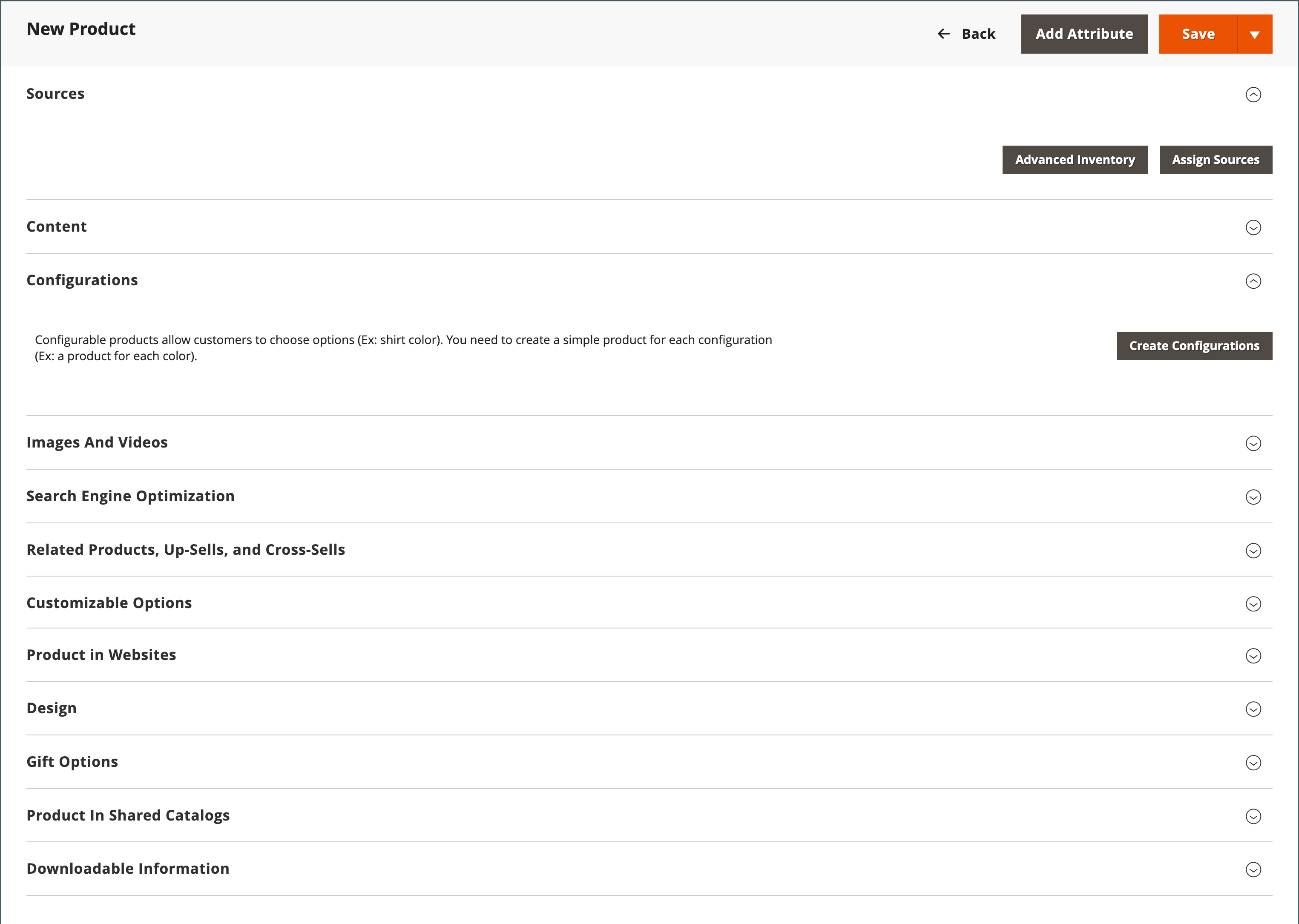
Yola ecommerce features:
- Shipping and Tax configurations
- Product Catalog Management
- Ability to checkout as guest
- Analytics and reporting
- Promotions features
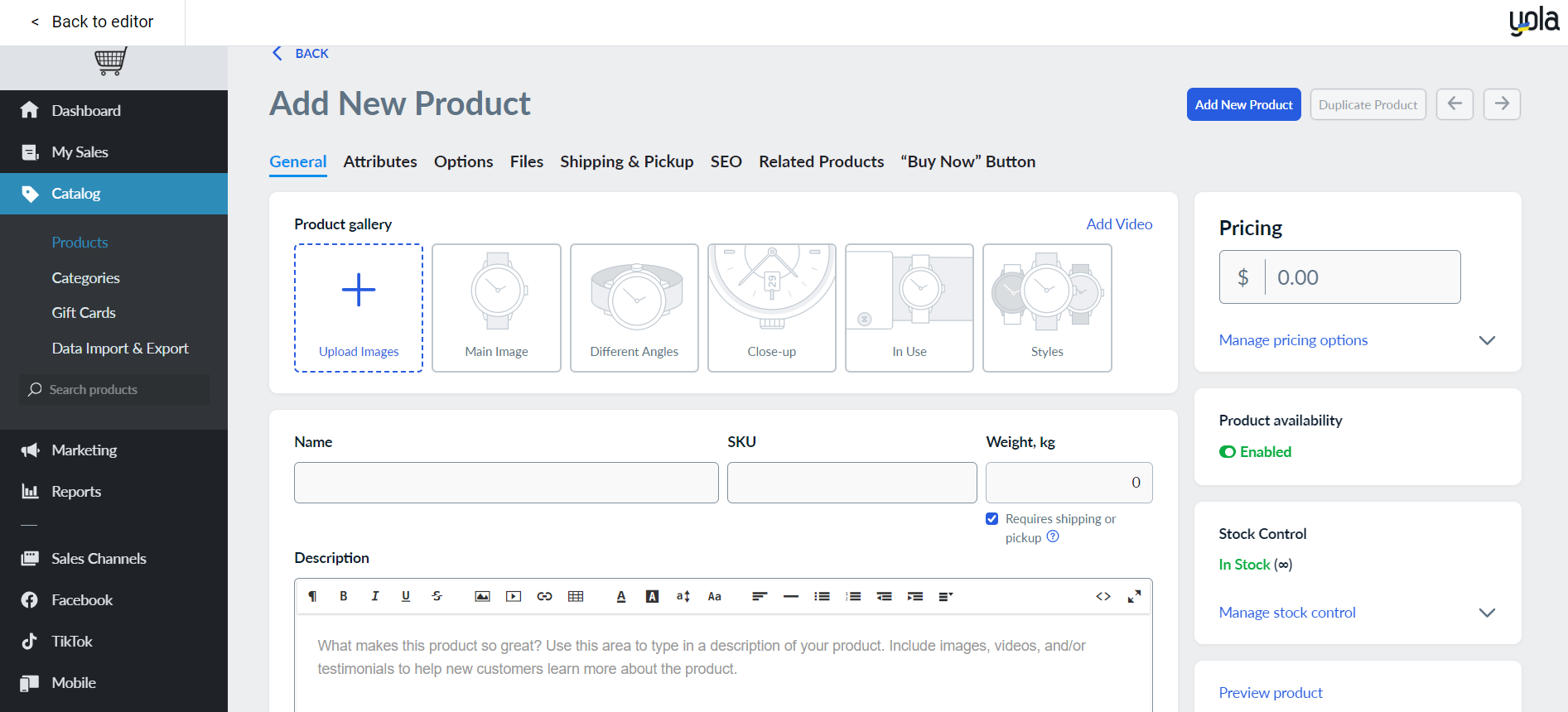
Ecommerce themes & templates
Adobe Commerce offers a comprehensive ecosystem for ecommerce themes and templates, enabling businesses to customize their online stores to meet specific branding and functionality requirements. In contrast, Yola offers a range of templates for building websites, including those suitable for ecommerce, but the variety and design quality may not match those provided by Adobe Commerce.
Product page customization
Adobe Commerce offers extensive customization options for product pages, enabling businesses to enhance the user experience and tailor product displays to their specific needs. This includes customizing layouts, product attributes, images and media, dynamic content like related products and reviews, and custom product options such as configurable and bundled products. Yola also offers a variety of customization options for product pages, including the ability to manage product options and combinations, and supports variable pricing for these product options.
Payment processing
Adobe Commerce offers integrated payment solutions and commission management for seamless online transactions, alongside POS integration for omnichannel retail experiences. It supports a wide array of payment gateways, ensuring flexible and secure payment options for customers. Yola supports various payment gateways for online store transactions, such as PayPal, Sage Payments, and American Express, allowing users to choose based on their specific needs, including geographical availability and fee structure. However, Yola doesn’t directly charge commission fees for transactions, the chosen payment gateway might impose its own fees, including transaction and possibly monthly fees.
Website Editors
Website EditorsEvaluates the platforms’ website building and editing capabilities.Score Components:
- Customization tools (40%): Range and power of editing features.
- Editor usability (30%): User experience within the editor.
- Design flexibility (20%): Freedom in layout and design changes.
- Update and maintenance ease (10%): Simplicity of updating and maintaining the site.
 7.8
7.8
 6.7
6.7
🏆
Winner: Adobe Commerce(ex Magento)
. Adobe Commerce(ex Magento), with a score of 7.8, offers a robust ecommerce platform designed for flexibility and scalability, enabling businesses to create customized online stores with extensive features for product management, customer engagement, and analytics. It supports both B2B and B2C models and offers a range of tools for marketing, SEO, and inventory management, along with a vast ecosystem of extensions. Suitable for businesses of all sizes, Adobe Commerce provides options for cloud-hosting or self-hosting, catering to a wide array of ecommerce needs.
Yola’s website builder editor, scoring 6.7, is designed for ease of use, allowing users to create professional-looking websites without needing coding knowledge. It offers a drag-and-drop interface, enabling users to easily add, customize, and position elements like text, images, and buttons on their web pages. The editor also provides access to a wide range of templates and customization options, including color schemes, fonts, and page layouts, to help users achieve their desired website look and feel. Additionally, Yola supports responsive design, ensuring websites look great on both desktop and mobile devices.
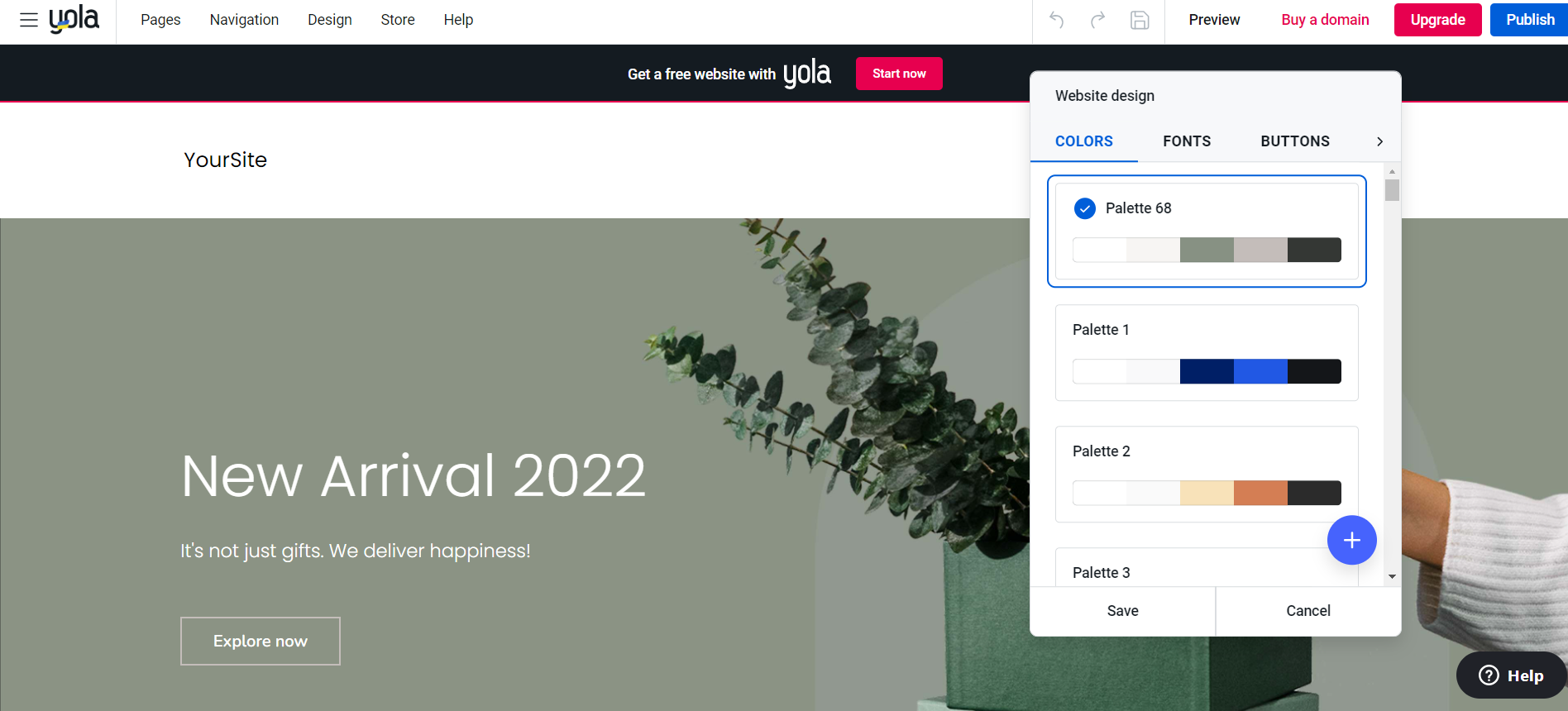
Mobile editor/app
 0
0
 4.5
4.5
🏆
Winner: Yola
. Both Adobe Commerce (ex Magento) and Yola do not offer a dedicated mobile app for website editing. However, Yola allows for some small changes using a mobile browser, while Adobe Commerce does not offer any mobile editing capabilities. Therefore, Yola scores higher in this category.
Product testing options
Product Testing OptionsAssesses the options for trying out platform features before commitment.Score Components:
- Trial quality (40%): Extent and usefulness of the trial or free version.
- Feature accessibility (30%): How many features are available to test.
- Trial duration (20%): Length of the trial period.
- Ease of transition (10%): Smoothness of moving from trial to paid plans.
 3.9
3.9
 7.5
7.5
Overall Result
:
Yola wins
. Yola scores 7.5, significantly higher than Adobe Commerce(ex Magento) with a score of 3.9. Yola offers a free version and allows testing of premium features during a 30-day refundable period. Adobe Commerce(ex Magento), on the other hand, does not offer a free or trial version, and premium features can only be tested by requesting a demo version.

|

|
|
|---|---|---|
|
Free Plan |
No |
Yes |
|
Trial Duration |
No | No |
|
Testing Premium Features |
By requesting a demo version |
During the 30-day refundable period |
|
Money Back Guarantee |
No |
30-day money back guarantee |
Price
PriceLooks at the cost-effectiveness and value for money of each platform.Score Components:
- Plan value (40%): What each pricing tier offers.
- Transparency and clarity (30%): Clearness of pricing structures.
- Flexibility of plans (20%): Range of options to suit different budgets.
- Hidden costs (10%): Additional expenses not included in the plan.
 5.8
5.8
 8.1
8.1
Adobe Commerce (ex Magento) is a premium solution with undisclosed pricing, while Yola offers a range of affordable plans with discounts for annual billing.

|

|
|
|---|---|---|
|
Free |
No offering at this amount. |
Free (Website) ($0/month)
Basic features with Yola subdomain, suitable for starting a simple site. With possibility to have up to 2 websites and 2 page limit. Free (Online Store Add-on) ($0/month) Launch an online store with basic features and a limited number of products. Available as an add-on to a website plan. |
|
$0-$10 |
No offering at this amount. |
Bronze (Website) ($9.45/month)
More resources and features, including unlimited pages and bandwidth. With possibility to have up to 5 websites. Value for price: 7.5 |
|
$10-$15 |
No offering at this amount. |
Basic (Online Store Add-on) ($15.00/month)
Includes inventory tracking, order management, and the ability to sell on Facebook. Available as an add-on to a website plan. Value for price: 7.0 |
|
$15-$20 |
No offering at this amount. |
Silver (Website) ($18.95/month)
Advanced design features and site customization options. With possibility to have up to 25 websites. Value for price: 8.0 |
|
$30-$35 |
No offering at this amount. |
Professional (Online Store Add-on) ($35.00/month)
Advanced features including discount coupons, product filters, and sales on multiple platforms like Facebook and Instagram. Available as an add-on to a website plan. Value for price: 8.0 |
|
$35-$40 |
No offering at this amount. |
Gold (Website) ($35.45/month)
Comprehensive plan with unlimited storage and advanced SEO tools. With possibility to have up to 25 websites. Value for price: 8.5 |
|
$90-$100 |
No offering at this amount. |
Unlimited (Online Store Add-on) ($99.00/month)
The most extensive plan offering a vast product catalog, point of sale integrations, and more, for expanding online business. Available as an add-on to a website plan. Value for price: 9.0 |
|
$2000+ |
Adobe Commerce Pro and Managed Services ($2000/month)
Adobe Commerce Pro and Managed Services are designed to deliver scalable, secure, and extensive eCommerce solutions tailored to a wide range of business demands. It offers a comprehensive set of ecommerce tools, including product and inventory management, efficient order processing, customer account management, targeted marketing capabilities, diverse payment processing options, robust security measures, and scalability to accommodate business growth. It also offers both self-hosted and cloud-hosted options, providing flexibility and optimized performance. While it does not have an AI website builder, it offers a powerful theme framework for comprehensive control, including frontend editing for basic adjustments. Experienced developers can employ custom code for unique designs and advanced functionalities. |
No offering at this amount. |
location. As a result in rare cases the prices displayed here can differ from the ones you see on their
websites.
Hosting quality
Hosting
qualityExamines the reliability and performance of the hosting solutions.Score Components:
- Uptime (40%): Consistency and reliability of website availability.
- Speed (30%): Loading times and performance.
- Bandwidth and storage (20%): Sufficiency of resources provided.
- Data centers (10%): Quality and distribution of hosting infrastructure.
 8.1
8.1
 7.2
7.2
🏆
Winner: Adobe Commerce(ex Magento)
Adobe Commerce (ex Magento) offers robust and scalable eCommerce solutions with both self-hosted and cloud-hosted options, providing flexibility and optimized performance. On the other hand, Yola offers managed cloud hosting with storage from 1GB on the free plan and up to unlimited on the highest plan. Adobe Commerce (ex Magento) provides an uptime guarantee for its managed hosting, while Yola guarantees an uptime of 99.9%. Adobe Commerce (ex Magento) leverages Amazon Web Services (AWS) for its cloud infrastructure, but specific data center details are not publicly available. Yola has 5 data centers located in the US and EU. Based on these factors, Adobe Commerce (ex Magento) has a higher hosting quality score than Yola.

|

|
|
|---|---|---|
|
Do they offer hosting? |
Yes, Adobe Commerce offers robust and scalable eCommerce solutions with both self-hosted and cloud-hosted options. |
Yes, Yola offers hosting with storage from 1GB on free plan and up to unlimited on highest plan. |
|
Data Centers: |
Adobe Commerce on Cloud infrastructure Leverages Amazon Web Services (AWS), Specific data center details not publicly available |
5 data centers located in US and EU |
|
Type of hosting: |
Self Hosting, Managed Hosting |
Managed Cloud Hosting |
|
Uptime: |
Uptime Guarantee for Adobe Managed hosting is provided |
99.9% |
|
Uptime Guarantee: |
Yes |
Yes, 99.9% |
Website Speed Optimization
Website Speed OptimizationEvaluates optimization of website loading timesScore Components:
- PageSpeed Score (30%): Google’s score indicating performance optimization.
- Loading Time (30%): The average time until a website is fully interactive.
- Mobile Optimization (15%): Optimization effectiveness for mobile devices.
- Resource Optimization (15%): Optimizing images, scripts, and other heavy resources.
- CDN Usage (10%): Use of CDN to enhance speed across geolocations.
 6.6
6.6
 7.5
7.5
🏆 Winner: Yola
Both Adobe Commerce(ex Magento) and Yola prioritize website performance and page speed, but Yola has a slight edge in terms of website speed optimization.

|

|
|
|---|---|---|
|
Focus |
CDN, Database optimization, Caching, Indexing |
CDN, Caching, Code Minifcation, Server response time improvements, Image optimization |
|
Performance Tools |
Google Lighthouse, PageSpeed Insights |
Google PageSpeed Insights Integration |
|
Key Strategies |
CDN, Database optimization, Caching, Indexing |
CDN, Caching, Code Minifcation, Server response time improvements, Image optimization |
|
Load Times |
Varies widely, dependent on optimization |
Varies widely, dependent on optimization |
|
Page Speed Scores Range |
Scores vary; influenced by plugins, images |
Varies widely, depending on the optimization, website complexity |
|
Core Web Vitals Improvement |
Emphasis on LCP, FID, CLS improvements |
Emphasis on LCP, FID, CLS improvements |
Adobe Commerce(ex Magento) focuses on enhancing website performance through strategies like CDN, database optimization, caching, and indexing. It emphasizes on improving Core Web Vitals (CWV) scores, particularly LCP, FID, and CLS. However, the load times and PageSpeed scores can vary widely, depending on the optimization and the influence of plugins and images.
On the other hand, Yola uses a variety of strategies for speed optimization, including CDN, caching, code minification, server response time improvements, and image optimization. Like Adobe Commerce(ex Magento), Yola also places emphasis on improving LCP, FID, and CLS scores. However, both load times and PageSpeed scores can vary widely, depending on the optimization and website complexity. Despite these variations, Yola’s comprehensive approach to speed optimization gives it a slight edge over Adobe Commerce(ex Magento).
Get a head start on website creation with AI
Create a custom website tailored to your business needs 10X faster with 10Web AI Website Builder!
Plugins and integrations
Plugins and integrationsMeasures the range and effectiveness of additional plugins and integrations.Score Components:
- Variety of options (40%): Range of available add-ons.
- Integration smoothness (30%): Ease of integrating plugins into the site.
- Quality of plugins (20%): Functionality and reliability of the options.
- Custom integration capabilities (10%): Support for custom or third-party integrations.
 9.1
9.1
 6.3
6.3
🏆 Winner: Adobe Commerce(ex Magento).
Adobe Commerce(ex Magento) scores a high 9.1, offering a vast array of extensions and plugins, estimated to be in the tens of thousands, covering aspects such as marketing, payment processing, shipping, content management, security, and optimization. On the other hand, Yola, with a score of 6.3, supports a variety of functionalities through plugins and apps, including social media integration, e-commerce tools, marketing and SEO enhancements, customer engagement features, and various utility widgets to improve user experience and compliance. However, the sheer volume and diversity of Adobe Commerce’s plugins give it a clear edge over Yola.
Adobe Commerce(ex Magento) Applications
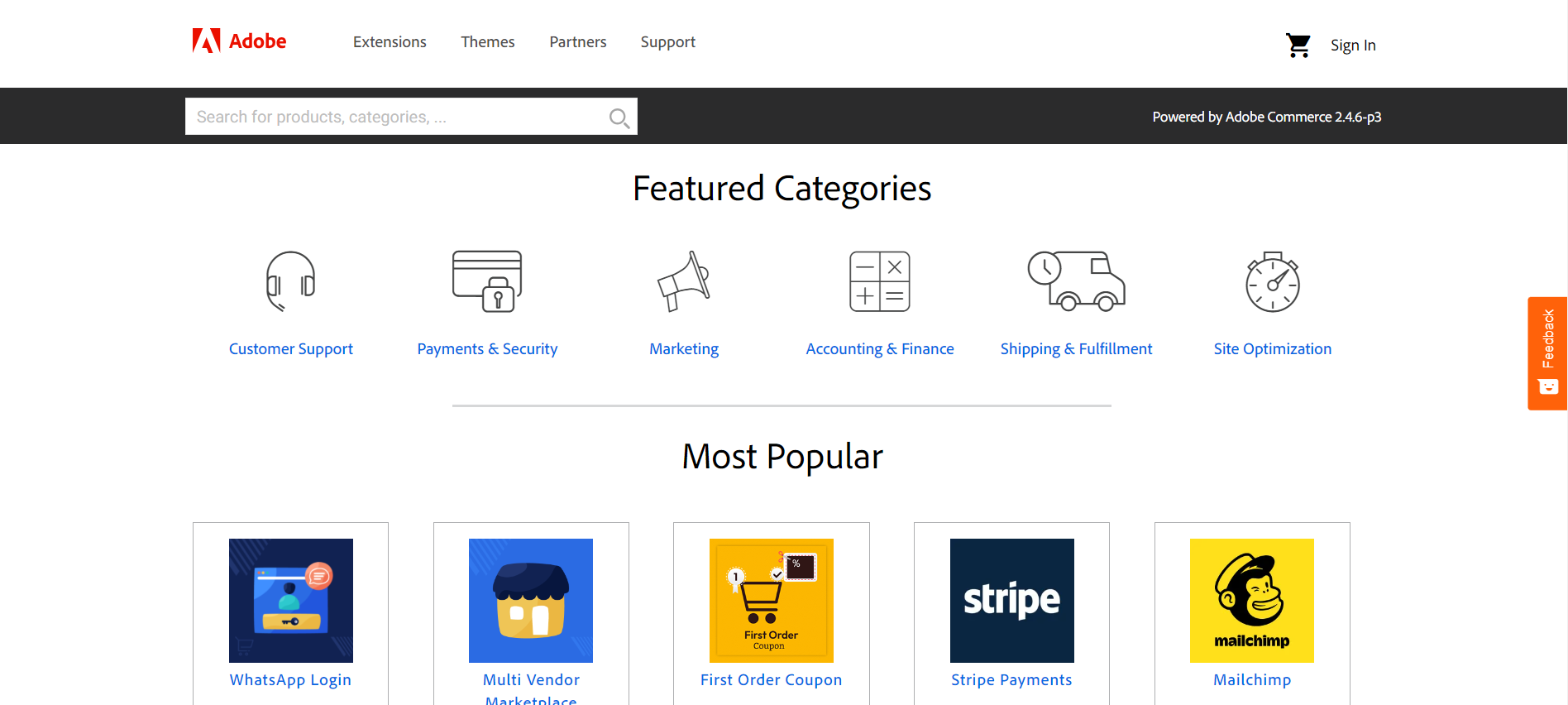
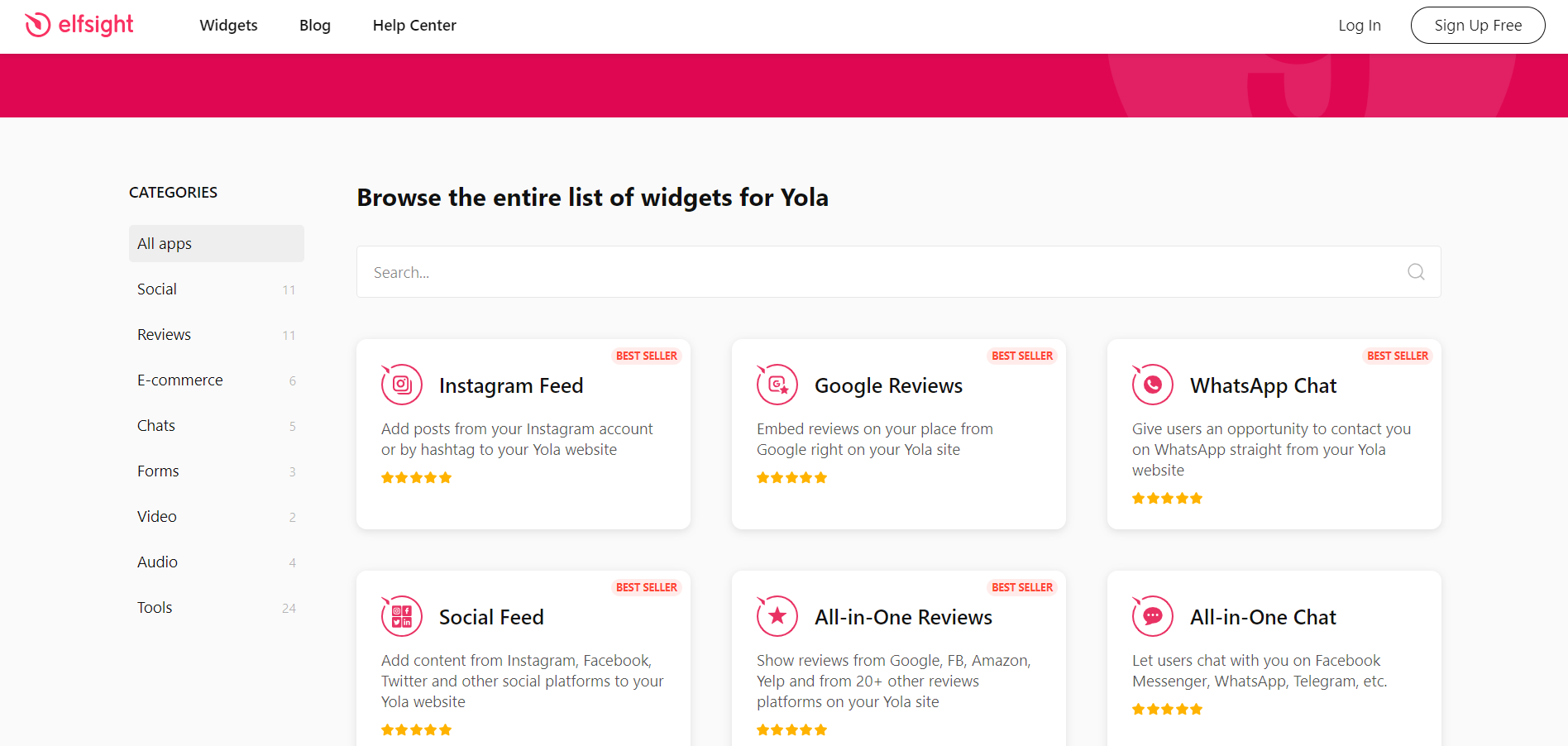
Marketing Features
Design FunctionalitiesRepresents how well each platform allows for creative design and customization of websites.Score Components:
- Template Variety (30%): Range and quality of design templates.
- Customization (30%): Flexibility and options for design alterations.
- User Interface (20%): Ease and intuitiveness of the design process.
- Responsiveness (10%): Adaptability to different devices and screen sizes.
- Innovation (10%): Unique design features and tools.
 8.1
8.1
 6.5
6.5
🏆
Overall Winner: Adobe Commerce(ex Magento)
. Adobe Commerce (ex Magento) stands out for its advanced marketing tools, especially in analytics, ad campaign management, and email marketing. Yola, on the other hand, offers basic marketing tools suitable for small businesses and individuals.

|

|
|
|---|---|---|
|
SEO Tools |
|
|
|
Email Marketing |
|
(Available on higher plans) |
|
Blogging |
Can be integrated with platforms like WordPress |
|
|
Social Media Integration |
|
|
|
Analytics and Reporting |
Adobe Commerce integrates with Google Analytics |
Basic analytics with possibility to integrate Google Analytics |
|
Ads and Promotions |
Advanced marketing tools for creating and managing promotions |
Available on higher plans |
Customer Support
Customer supportEvaluates the quality and availability of support options.Score Components:
- Response time (40%): Speed of support responses.
- Support quality (30%): Effectiveness and helpfulness of the support.
- Availability (20%): Range of support channels (phone, chat, email).
- Resource richness (10%): Quality of self-help and educational materials.
 8.3
8.3
 6.3
6.3
🏆 Winner: Adobe Commerce(ex Magento)
. When comparing Adobe Commerce(ex Magento) vs Yola, Adobe Commerce(ex Magento) stands out with a higher customer support score of 8.3. Adobe Commerce offers 24/7 support through phone, email, and live chat, along with a comprehensive knowledge base and community forums. Their enterprise-level support includes dedicated account management and access to a global network of experts, ensuring businesses receive the assistance they need to optimize their ecommerce operations.
Yola, on the other hand, provides 24/7 email support with priority responses for paid plan subscribers. While Yola offers a call-you-back service and support via social media channels, it lacks the extensive enterprise-level support that Adobe Commerce provides. With a customer support score of 6.3, Yola’s support is more suited for individuals and small businesses rather than large enterprises.
Security
SecurityLooks at the platforms’ security measures and data protection.Score Components:
- Data protection (40%): Safeguards for user and customer data.
- SSL and encryption (30%): Implementation of secure connections.
- Compliance (20%): Adherence to industry security standards.
- Regular updates (10%): Frequency of security updates and patches.
 8.4
8.4
 8.3
8.3
🏆
Winner: Adobe Commerce(ex Magento)
. Adobe Commerce (formerly known as Magento) provides robust security measures to protect online stores from potential threats. This includes regular security updates and patches to address vulnerabilities, secure payment processing, encryption to protect customer data, and tools for monitoring and detecting suspicious activity on the website.
Yola, while offering strong security measures such as SSL encryption, DDoS mitigation, firewalls, regular software updates, data backup, and recovery, as well as security audits and testing, falls slightly short in comparison to Adobe Commerce’s comprehensive security features.
AI Capabilities
AI capabilitiesMeasures the effectiveness of AI-driven features and tools.Score Components:
- Automation efficiency (40%): Impact of AI on streamlining processes.
- Personalization (30%): AI-driven customization for users or customers.
- AI-Assisted design (20%): Role of AI in website design and functionality.
- Data analysis (10%): Use of AI in interpreting user data and analytics.
 7.7
7.7
 0.0
0.0

|

|
|
|---|---|---|
|
Personalized Design |
|
|
|
SEO Optimization |
AI-driven recommendations for better search engine visibility |
|
|
Customer Behavior Analysis |
Advanced analytics to understand customer preferences |
|
|
Sales Predictions |
AI-powered sales forecasting tools |
|
|
Inventory Management |
AI tools to assist in efficient inventory handling |
|
|
Content Generation |
AI assistance in creating and optimizing site content |
|
🏆 Winner: Adobe Commerce (ex Magento)
. Adobe Commerce (ex Magento), with a score of 7.7, utilizes AI to enhance the ecommerce experience. Its AI features focus on customer behavior analysis, personalized shopping experiences, inventory management, and sales predictions. It also leverages AI to streamline content creation and optimization for eCommerce platforms, significantly enhancing efficiency and effectiveness.
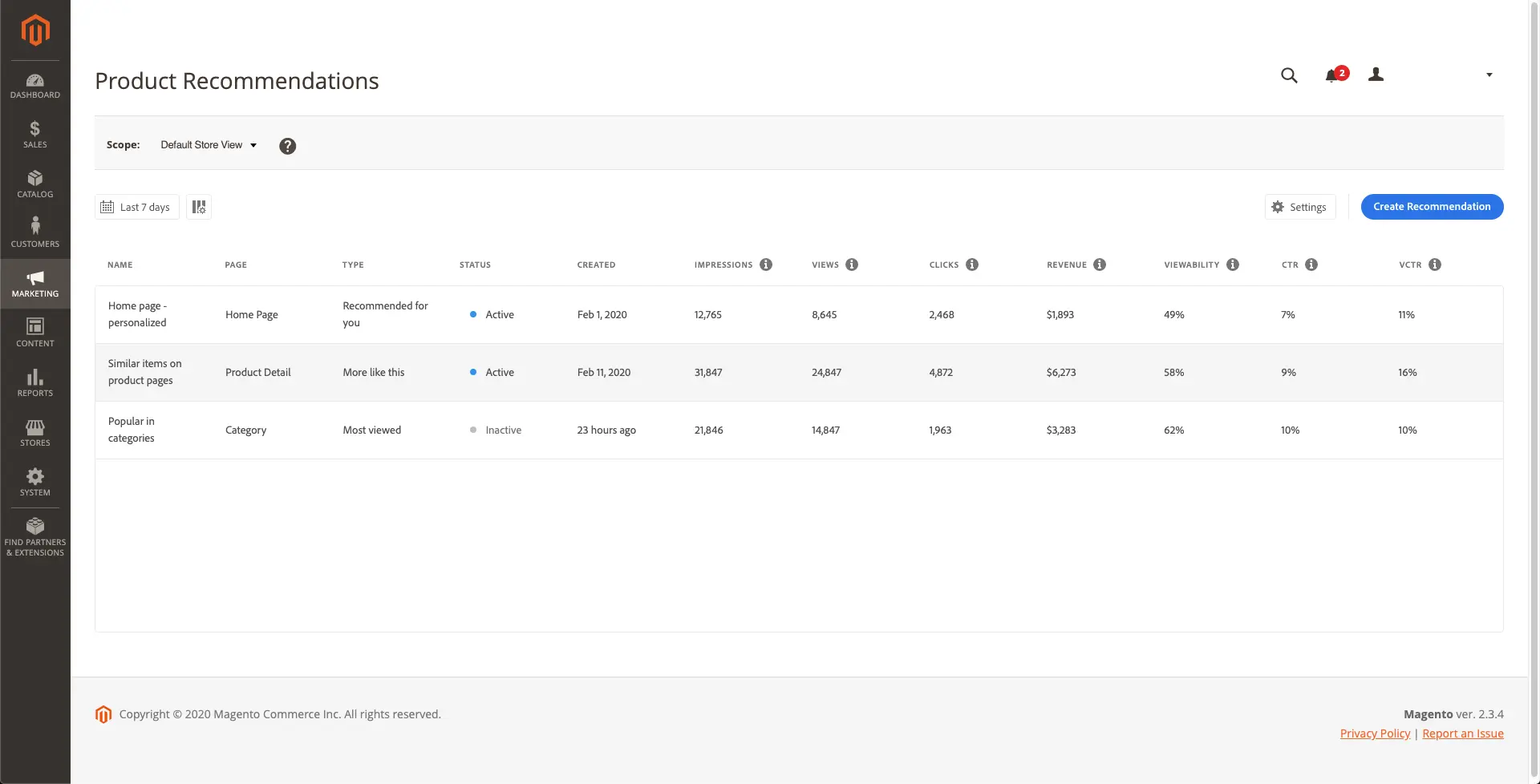
Yola, on the other hand, does not have any AI capabilities.
User Management
User ManagementAssesses the platforms’ capabilities in managing user roles, permissions, and accessibility.Score Components:
- Role Customization (40%): Flexibility in creating and defining user roles and
permissions. - Ease of Management (30%): User interface and tools for managing users.
- Access Control (20%): Effectiveness of access control measures for different user
levels. - Scalability (10%): Ability to manage a growing number of users efficiently.
 8.0
8.0
 7.3
7.3
🏆 Winner: Adobe Commerce(ex Magento)
. Both Adobe Commerce and Yola offer different levels of user access and control, but Adobe Commerce provides a more detailed and granular approach to user roles and permissions.
- Adobe Commerce’s user management depends on user licenses and roles. User licenses, bought separately, determine the total number of users allowed, with additional licenses purchasable as needed. Roles and permissions, managed within the available licenses, control access and modifications, ensuring data security and efficient workflow.
- Yola supports multi-user editing capabilities, allowing different levels of access and control based on the plan chosen. The primary account holder, often referred to as the Owner or Administrator, possesses comprehensive control over the website, including the ability to edit content, manage settings, and extend invitations to collaborators for website modification. Collaborators or Editors, invited by the account holder, can edit the website to varying degrees, which might range from content editing to page management, depending on the permissions granted by Yola’s platform.
Adobe Commerce(ex Magento) User Roles and Access Levels:
| Role | Description | Access Highlights |
|---|---|---|
| Administrator | Has full permissions to all aspects of Adobe Commerce, including global settings and data. | Full access to all settings, data, and functionalities within Adobe Commerce. Can manage other users’ roles and permissions. |
| Store Administrator | Responsible for the day-to-day management of the store, including products, orders, and customer service. | Access to manage products, process orders, and handle customer inquiries, but may have restricted access to sensitive global settings or data. |
| Design Team Member | Focuses on the aesthetic and user experience aspects of the store, working on content design and layout. | Access to content design tools and functionalities, but restricted from accessing customer, order information, and other sensitive areas. |
| Default User (B2B) | Has view-only access to company profile and credit information, and full access to activities related to sales and quotes. | Full access to sales and quotes activities; view-only for company profile and credit information. |
| Senior Buyer (B2B) | Engaged in purchasing, with access to all Sales and Quotes resources, and view-only permissions to the Company Profile, User and Teams, Payment Information, and Company Credit. | Comprehensive access to Sales and Quotes, with limited viewing rights for company’s financial and profile data. |
| Assistant Buyer (B2B) | Assists in purchasing activities, with permissions to place orders using Checkout with Quote, and to view orders, quotes, and company profile information. | Permission to execute orders and access relevant purchasing data; view-only access to company profile information. |
Yola does not provide a detailed user roles table.
Additional Features

|

|
|
|---|---|---|
|
SSL Certificate |
|
|
|
Custom Domain |
|
|
|
Free Custom Domain Included |
|
|
|
International Domains |
|
|
|
Mobile Responsive |
|
|
|
Page Speed |
|
|
|
Website Builder Mobile App |
|
|
|
Convert a Website To An App |
|
|
|
Website Analytics |
|
|
|
Multilingual Sites |
|
|
|
Multiple Users |
|
|
User Feedback
Adobe Commerce (formerly Magento Commerce) receives high praise for its comprehensive ecommerce solutions, offering features like customer and order management, scalability, and customization options. Users appreciate its flexibility and ease of use, although some mention a learning curve due to its extensive features. Despite occasional drawbacks like slow speed or complexity, Adobe Commerce proves beneficial for businesses seeking robust ecommerce platforms, aiding in sales growth, customer management, and overall efficiency in managing online stores.
Yola seems to have received mostly positive reviews. Users appreciate its professional templates, ease of use, affordability, and customer service. They find it ideal for website creation, especially for those without specialized knowledge. However, some users express dissatisfaction with aspects such as data security, customization limitations, and lack of certain features like chat support. Overall, Yola appears to solve the problem of easy website creation and maintenance for businesses and individuals, offering a range of templates and tools at a reasonable price point.
The making of this blog
We followed a clear, step-by-step process to write and research this article.
FAQ
Which platform is better for large-scale ecommerce, Adobe Commerce (ex Magento) or Yola?
Can I use Yola for creating a professional-looking website without technical skills?
How do Adobe Commerce (ex Magento) and Yola compare in terms of customization and flexibility?
What are the main differences in pricing between Adobe Commerce (ex Magento) and Yola?
Which platform offers better support for SEO and marketing?
Can I manage multiple users and roles on both platforms?
How do the platforms compare in terms of website speed and performance optimization?
Which platform is recommended for businesses looking for AI-driven ecommerce solutions?










